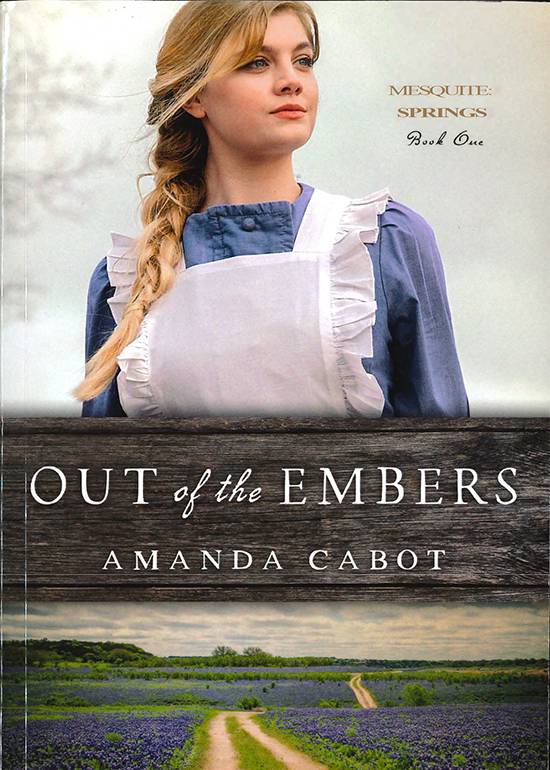Burning Heart

Out of the Embers
by Amanda Cabot
Grand Rapids: Revell, 2020.
336 pp. $15.99 Paperback.
Reviewed by
Devyn Vest
My eyes barely left the page after the first line “someone was watching.” The urgency of Amanda Cabot’s Out of the Embers establishes itself right away. In fact, the first few pages of Cabot’s novel do a fine job of setting up the world, the conflict, and the characters we're following. Set in Texas Hill Country in the mid-1850s, Evelyn Radcliffe and a young girl named Polly flee from the ashes of the orphanage they both called home and Evelyn called work. Evelyn’s inner monologue alludes to the conflict that brews throughout the novel: someone with ill intent is looking for her.
Cabot's style sucks you in. She has a modern voice, but the atmosphere of her text stays in the nineteenth century. While sounding contemporary, Cabot’s writing didn’t take me out of the narrative, but rather helped educate me about nineteenth century Texas. The simplicity of Cabot’s voice makes it easier for her to have multiple bouts of conflict without losing the reader to the finer details. Murder, politics, and romance are the three conflicts that stick out the most.
Evelyn’s conflict begins the second she and Polly are…out of the embers. She suddenly connects the dots as to why the orphanage burnt down. It was to target her. Part of Evelyn’s urgency to flee the scene, aside from protecting herself, is to protect Polly. These characters echo the older sister-younger sister dynamic seen in other texts, despite having no relation. Like Katniss with Prim from The Hunger Games, Evelyn wants to keep Polly innocent and safe from harm. They stumble into Mesquite Springs, Texas, and make it their place to start over. Evelyn finds newfound responsibility over Polly and must find a way to provide for them both. Evelyn comments on her fears once she came to terms with her newfound role as Polly’s caretaker, saying “[i]t was a frightening prospect for a woman with only one skill.” Once Evelyn meets this new reality and role in life, that’s where her evolution begins. By the end, she makes a good life for her and Polly, but she’s not taking that burden on by herself.
I will admit this now: I am a sucker for romance in (most) novels. When horse wrangler Wyatt joins the narrative and begins interacting with Evelyn, my interest piqued. Cabot’s unraveling of their romance is littered with clichés, but despite being cliché, I could not stop reading those passages. Her cheeks flush whenever he looks her way. He smirks in an innocent enough way whenever she speaks. Even the “love triangle” between Evelyn, Wyatt, and Sam where it’s apparent to readers and other characters that Evelyn has no interest in being a mayor’s wife or rather, just Sam’s wife, and would rather take up with the horse wrangler she’s been getting closer with. It’s nothing inventive to the genre, and at times becomes predictable. The best pieces of Cabot’s writing come during quieter times when Evelyn doesn’t constantly think about dead parents or how much her heart swells whenever Wyatt walks into the room. When Evelyn allows herself to feel vulnerable for a moment just because she’s human, that’s where the novel shines. Evelyn working to provide for herself and Polly is a part of the story I wish was at the center more, but romantic love is always front and center of novels like this.
The weaker portions of the novel come with expositional narration. Midway through the novel, for example, Wyatt’s mother and Evelyn have an interaction about what Wyatt was like as a child that feels so removed from the reality of how that conversation would take place in the real world. Of course, Wyatt’s rambunctious nature is also a cliché. He never grew out of it, as he takes his horses out for gallops periodically throughout the novel, but he’s simultaneously ready to be tamed by domesticity. I’m surprised Cabot did not compare Wyatt’s profession of wrangling horses to Evelyn wrangling his heart.
Overall, this novel will easily entertain fans of romantic westerns. Cabot smartly ended the novel with their nuptials. No more conflict. No more murderers running on the loose. Evelyn and Wyatt get their happily ever after, but this is just book one of multiple Cabot plans to write after. Who knows, maybe Evelyn and Wyatt will appear again.
Devyn Vest is a graduate student at Texas State University.
